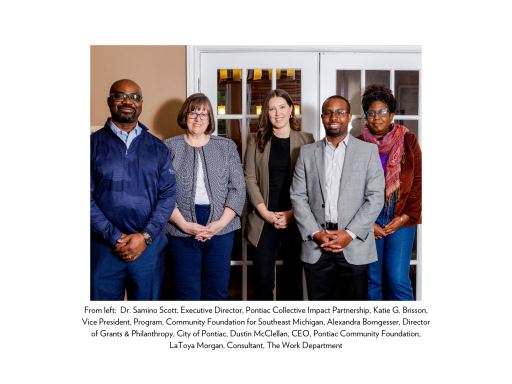The Pontiac Funders Collaborative is supporting Pontiac organizations' collaboration and bolstering their capacity to influence, manage and deploy American Rescue Plan Act (ARPA) funding toward equitable outcomes that support entrepreneurship and youth in Pontiac.
As CMF reported, Michigan is receiving significant funding through federal and local recovery dollars. As part of the ARPA, Michigan is receiving an estimated $10 billion dollars with $1.8 billion in Coronavirus Local Fiscal Recovery Funding being allocated directly to 49 Michigan cities and townships.
The Community Foundation for Southeast Michigan (CFSEM) manages the Pontiac Funders Collaborative, which is a group of 10 regional funders that have pooled financial support for key nonprofit organizations in Pontiac.
The Collaborative received funding from CMF’s Statewide Equity Fund (SEF) after being named a regional collaborative lead in the SEF Strategic Support Pilot.
The SEF is a $2 million pooled fund powered by philanthropy and administered by CMF, which empowers CMF members to strategically pool resources toward systems change efforts with an equity-centered approach, initially focused on economic prosperity.
Katie G. Brisson, vice president of program at CFSEM, shared that the first round of funding from the SEF supported four current partners of the Collaborative to work with technical assistance providers. These partners of the Collaborative include the city of Pontiac, the Pontiac Community Foundation, the Pontiac Collective Impact Partnership and Main Street Pontiac.
“These technical assistance providers focused on working with organizations in Pontiac to build capacity that strengthened their internal systems while deepening their economic development strategies through an equity lens and connected them more intentionally to one another,” Brisson said.
The second round of funding from the SEF is supporting the implementation of two entrepreneurship projects developed by these organizations aimed at leveraging government funds. The projects promote entrepreneurial efforts and work to create career opportunities for young adults in the community.
Brisson shared that the SEF funding is assisting the Pontiac Community Foundation in promoting entrepreneurial efforts for its Center for Pontiac Entrepreneurship.
The SEF funding has allowed the Pontiac Community Foundation to support its Small Business Roundtable in collaborating and tailoring localized services based on input from entrepreneurs.
According to Brisson, the community foundation is also utilizing the funding to provide stipends to members of its Small Business Roundtable to cover the cost of participation in the roundtable and supplement the cost of work in service to Pontiac entrepreneurs.
The Pontiac Collective Impact Partnership is advancing its efforts to create career opportunities for young adults through exposure to entrepreneurship via summer internships and other approaches. Its strategy is also to work in collaboration with community partners to promote localized, tailored efforts that advance the economic mobility of Pontiac youth.
The Pontiac Collective Impact Partnership is utilizing the SEF funding to test new models for youth entrepreneurs that fit into the local landscape and direction.
“Both organizations are working in partnership with the city of Pontiac as it deploys ARPA funding to support small businesses, ensuring community voice is embedded in the process of distributing funds,” Brisson said.
CFSEM has served to convene these organizations and the city regularly as this collaboration is being developed.
Brisson shared that Pontiac is a community with high poverty, a large population of youth and people of color whose voices are often left out of decisions that impact their future.
“The economic development strategies of each of the four beneficiaries of this project are deeply informed by residents and community partners, and also already engaged together within the Pontiac Collective Impact Partnership, which is a convening body that collaborates around shared goals for community improvement,” Brisson shared.
Brisson shared that in recent years the city government in Pontiac has been recovering from limited staff capacity and access to funding. New departments have been created, and new staff have been hired.
“Our partner organizations have expressed that this change, paired with the influx of ARPA funding and a set of community-informed priorities presents an opportunity for the city to be a good partner for the first time in many years,” Brisson said.
However, the city’s new staff are playing catch up to decades of disinvestment, which limits their capacity to move quickly.
“The city’s approach has been to work closely with community partners, like those involved with SEF funding, to implement projects that improve quality of life for residents. The Pontiac Funders Collaborative has played a role in helping to build out the capacity of the city to attract and manage additional federal funding moving forward,” Brisson said.
As part of the SEF, the Pontiac Funders Collaborative and four other CMF members around the state are leveraging their convening power and working closely with their local units of government and community to shape incoming federal funding toward equity-centered approaches to advance economic prosperity.
CMF members Ann Arbor Area Community Foundation, Community Foundation of Greater Flint, Grand Rapids Community Foundation and the Community Foundation of Marquette County are also engaging in their own work through the SEF to advance equitable outcomes toward economic prosperity through the SEF in their respective geographic service areas.
The SEF is supported by CMF members the W.K. Kellogg Foundation, Ralph C. Wilson Jr., Foundation, Charles Stewart Mott Foundation, Ballmer Group, DTE Foundation, Ford Foundation, The Kresge Foundation, the Skillman Foundation, the Joyce Foundation, the Hudson-Webber Foundation, Community Foundation of Marquette County, Community Foundation for Southeast Michigan and Grand Rapids Community Foundation.
Want more?
Learn more about the Community Foundation of Marquette County SEF site’s cross-sector collaboration to align incoming ARP resources with Marquette County’s 2040 plan focused on increasing access to affordable childcare and ending homelessness.
Learn more about how the Grand Rapids Community Foundation SEF site is working with the city of Grand Rapids in supporting a participatory budgeting process that engages residents in allocating ARP resources.
Explore CMF’s Strategic Support Pilot Resource page, a curated collection of resources highlighting data, tools and resources related to shaping public dollars.
Learn more about the Pontiac Funders Collaborative.
